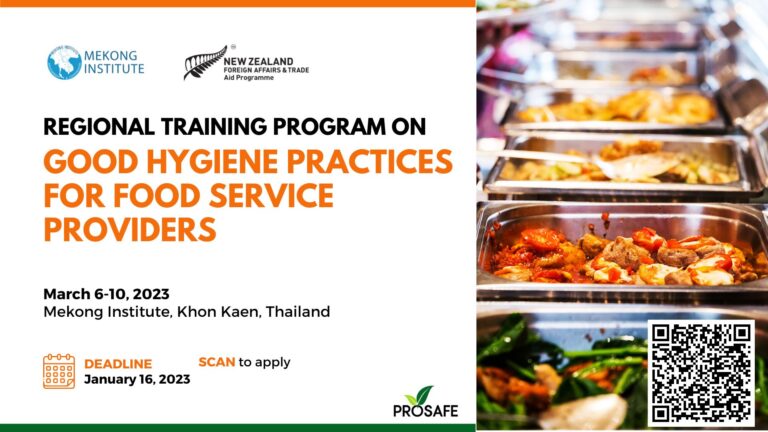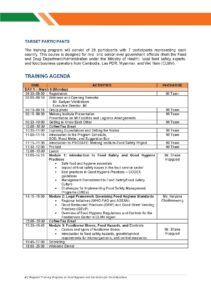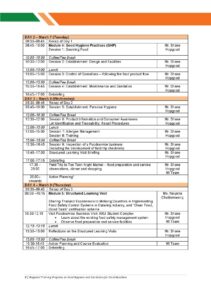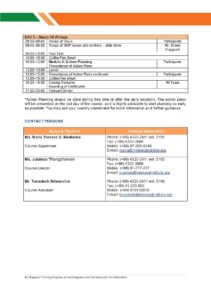

Globalization has stimulated growing consumer demand for a wider variety of foods, resulting in an increasingly complex and longer global food chain. The production of safe food is becoming increasingly important for protecting consumers from the hazards of foodborne illnesses, which occur at different stages of the food chain starting from the primary production to the consumption stage. According to the World Health Organization (WHO), a large proportion of foodborne disease incidents are caused by foods improperly prepared or mishandled by food handlers at home and in food business operations. Health authorities need to implement strict laws and regulations dealing with food handling hygiene practices. This ensures that food handlers follow the required rules and regulations for proper hygiene and sanitation.
All consumers have the right to expect and demand safe and good quality food. Implementing Good Hygiene Practices (GHP) covers the minimum sanitary and hygiene practices for food handlers to ensure that food is safe and suitable for human consumption. Foodborne illnesses can result from contamination due to improper practices such as lack of environmental hygiene and poor sanitation, poor control of food processes, mixed and inappropriate transportation, poor storage, poor personal hygiene, and unsafe sources of food.
This food safety training course focuses on Good Hygienic Practices (GHP) in the food service sector. This course introduces the participants to the basic principles of food safety, hygiene, and sanitation. It discusses food safety hazards and how to adequately control them. This GHP course lays the foundation for other food safety management systems to build upon.
The 5-day training course also includes action planning for the participants to be able to help them apply their gained knowledge and skills in their place of work.
This course is designed for government officials to gain insights and knowledge for improved assistance and guidance to food business operators for conformance and compliance to food safety and hygiene requirements. It will assist food handlers in food service/catering premises to understand their responsibilities with regard to handling and producing food that is safe for the consumer, including guidance on relevant legislation, control of food safety hazards, temperature control, food storage, food preparation, pest control, personal hygiene, and premises cleaning and sanitation.
After completing this course, participants will:
- Understand the importance of food hygiene and recognize the types of health issues poor food hygiene may cause;
- Be able to identify the various types of food safety hazards and control measures;
- Understand what regulations say about food hygiene and how businesses can comply;
- Explain the principles of food safety management systems and the requirements of Good Hygiene Practices (GHP);
- Explain the role of personal hygiene in preventing contamination and foodborne illness, including steps in proper hand washing; and
- Increase networking and interaction among participants for future collaborative work on food safety.
A variety of training methods will be employed such as lectures, exercises, workshops, role-play, and case studies in order to enhance learning and gain cooperation and active participation. The training materials consist of a workbook, ppt presentation, case study, workshops/exercises, and field visit profiles. Likewise, suggested readings will be distributed to the participants.
The training program will cover the following modules:
Module 1: Introduction to Food Safety and Hygiene
This module introduces the participants to the importance of good food hygiene practices and why it is crucial in the food business. The module tackles important aspects of food safety and health issues that consumers may develop from contaminated food.
- What is safe and suitable food?
- Food safety definitions and references e.g., Codex Principles of Food Hygiene CXC 1, 1969 (2020)
- Why is food hygiene important?
- Impact of food safety in the food service sector
- Management commitment to food safety/Food Safety Culture
- Challenges of implementing food safety management programs
Module 2: Legal Framework Governing Food Hygiene Standards
This module explains the key food safety legislation that food business operators must comply with, including food handling and regulation, and Codex General Principles of Food Hygiene. The module also highlights the food hygiene regulation and controls in different countries, particularly sharing the experiences of New Zealand, Thailand, and CLMV.
- Regional initiatives (WHO- FAO and ASEAN)
- Available standards for the catering industry in the region (Good Restaurant Practices (GRtP) and Good Street Vending Practices (GSVP)
- Food hygiene regulations and controls in CLMV region
Module 3: Food Safety Hazards and Controls
This module focuses on the four most common food safety hazards that may be present in a workplace and how they pose a risk to consumers if they get into food. This module also introduces various techniques in controlling cross-contamination and food safety hazards with proper food hygiene practices.
- Causes and types of foodborne illness
- Food Safety Hazards
- Physical Hazards and Their Control
- Chemical Hazards and Their Control
- Food Allergens
- Biological Hazards
- Types of Microorganisms
- Growth Requirements of Microorganisms
- Control Measures for Microorganisms – food preservation
Module 4: Good Hygiene Practices (GHP) for Food Handlers
Good Hygienic Practices are minimum sanitary and food handling requirements necessary to ensure the production of safe and suitable/wholesome food.
The system is based on four prescribed requirements:
- personnel practices
- premises controls – building facilities, equipment, and utensils (including design, layout/flow, construction, maintenance, cleaning and sanitation, calibration, pest and waste management)
- products – understanding food safety characteristics of foods (e.g., potentially hazardous foods)
- process controls – including food preservation methods (cook-chill-serve cold, cook-serve hot, cook-chill-reheat-serve hot, assemble prepared foods, etc.)
GHP specifies process control requirements to be satisfied at each step of the food handling process. Some requirements relate to the receipt, storage, preparation/making of foods, display and/or service. This module introduces a set of GHP applications dealing with food hygiene and sanitation in food service.
- Sourcing foods
- Establishment design and facilities
- Control of operations (including food preparation and service) – following the food product flow
- Maintenance and sanitation (cleaning, pest control, waste management, re-usable item controls
- Personal hygiene
- Product information and consumer awareness
- Traceability and Recall
- Allergen Management
- Training
- Inspection of a Foodservice Premises
Module 5: Structured Learning Visit (SLV)
Participants will be exposed to food business operators (restaurant/canteen/Night Market food stalls, Hotel or Hospital Kitchens) who have food hygiene certification or food safety assurance systems in place, so participants can directly learn and observe the current practices of Thai food handlers in implementing GHP and HACCP.
- Food Hygiene Regulations and Control system in Thailand
- Thailand Case – Clean Food Good Taste Certification System
- Field Visit to KKU Student Complex
- Field visit to Ton Tan Night Market
Module 6: Action Planning
In order to apply the gained knowledge and skills from this training course, food business operators are required to develop action plans for the implementation of GHP and food safety management systems in their respective food businesses. For government officials, their action plan will focus on improving food hygiene regulations and guidelines, delivering localized GHP training, and developing education materials for food handlers and consumers.
The training program will consist of 28 participants with 7 participants representing each country. This course is designed for mid- and senior-level government officials (from the Food and Drug Department/Administration under the Ministry of Health), local food safety experts, and food business operators from Cambodia, Lao PDR, Myanmar, and Viet Nam (CLMV).
Ms. Maria Theresa S. Medialdia (Course Supervisor)
Phone: (+66) 4320-2411 ext. 3101 Fax: (+66) 4320-3656
Mobile: (+66) 87-365-6240
E-mail: [email protected]
Ms. Jutamas Thongcharoen (Course Leader)
Phone: (+66) 4320-2411 ext. 3103 Fax: (+66) 4320-3656
Mobile: (+66) 81-717-017
E-mail: [email protected]
Mr. Tanadech Sriwanchai (Course Assistant)
Phone: (+66) 4320-2411 ext. 3106 Fax: (+66) 43 203 656
Mobile: (+66) 910139679
E-mail: [email protected]




